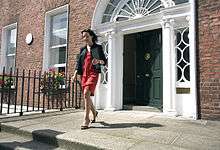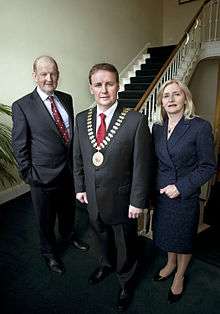Institute of Certified Public Accountants in Ireland
|
| |
| Abbreviation | CPA Ireland |
|---|---|
| Formation | 29 January 1943 |
| Legal status | Company limited by guarantee |
| Objective | Education, licensing and regulation of professional accountants |
| Headquarters |
Dublin, Ireland |
| Region served | Republic of Ireland and Northern Ireland |
| Membership | c. 4,000[1] |
| Students | c. 1,000 |
| Member's designations | CPA, FCPA |
| President | Cormac Fitzgerald |
| Website |
www |
The Institute of Certified Public Accountants in Ireland (CPA Ireland) is a professional body for Certified Public Accountants (CPAs) in Ireland. It is one of the main Irish accountancy bodies, with 5,000 members and students.[2]
The CPA designation is the most commonly used designation worldwide for professional accountants. CPA Ireland was founded in 1943, and the Institute's qualification is recognised in many other countries under mutual recognition agreements. Its members work in accountancy firms, the public sector, the financial services, and other private sector businesses.
The Institute is a member of the Consultative Committee of Accountancy Bodies – Ireland (CCAB – I), a founding member of the International Federation of Accountants (IFAC),[3] and a member of the Fédération des Experts Comptables Européens (FEE), the representative organisation for the profession in Europe.
CPA Ireland has headquarters in Dublin and Belfast.
History of CPA Ireland
The Institute of Certified Public Accountants was founded as the Society of Public Accountants on 29 January 1943. The first two students sat their CPA exams in 1951 and that number has since grown to over 5000 members and students in 2011.

In 1961 the Society gained legal recognition and changed its name to The Irish Society of Certified Public Accountants Ltd; this was changed again in 1971 to The Institute of Certified Public Accountants in Ireland.
The Institute was invited to join the Consultative Committee of Accountancy Bodies – Ireland in 1991.
CPA Ireland held merger discussions with the 20,000-member Institute of Chartered Accountants in Ireland in 2001 and again in 2003, but on both occasions the respective Councils of each body decided not to proceed to a vote of members on the issue.[4]
Council of the Institute

The Council of the Institute is made up of 16 elected members and up to three non-members, including the President and Vice-Presidents of the Institute. The Council meets approximately eight times a year to set policy on areas like the regulation of members in the public interest, the growth and development of the Institute and examination and training standards.
The office-holders for 2015/2016 are:[5]
- Brian Purcell (President)
- Nano Brennan(Vice-President)
- Deirdre Kiely (Vice-President)
Qualification
Students do not need a business or accountancy-related degree to become an accountant; CPA students include school-leavers, mature students and graduates. Previous qualifications may entitle students to exemptions.
Students can study at 16 approved educators around Ireland. There is no registration fee required and students can avail themselves of full-time, part-time, distance, weekend and e-learning options.
There are four stages of examinations with the CPA Institute; Formation 1 and 2 and Professional 1 and 2. Students must complete three years of training to apply for membership of the CPA. Training can take place in practice, industry or both. Students may first study for the CPA exams and obtain the required training at a later date.
Practice
CPA Members who wish to engage in public practice must hold a practising certificate, which requires completion of a Practice Orientation Course and examination, and two years' experience in their intended practice area after admission to membership.
Audit
To be eligible to act as an auditor, CPA members must hold an audit certificate, requiring a practising certificate and an audit qualification. To obtain this, members must have three years' experience supervised by a registered auditor.
Role

As the Institute is a recognised body, it has a statutory obligation to oversee the professional activities of its members in practice, ensuring that education and training standards are maintained.
"The role of the Institute is to:
- regulate CPAs in accordance with the law and the Institute's Code of Ethics in the public interest,
- ensure that CPAs are constantly up to date in all matters relating to their professional work,
- maintain the highest levels of educational standards for new entrants to the profession, and
- represent the interests of our members where appropriate."[6]
Mutual recognition

CPA Ireland members work in over 40 countries. The Institute has Mutual Recognition Agreements (MRAs) with CPA Australia,[7] ICA India,[8] ICA Bangladesh and CGA Canada,[9] South African Institute of Professional Accountants (SAIPA),[10] the Association of National Accountants of Nigeria (ANAN) and Institute of Cost and Management Accountants of Pakistan (ICMA Pakistan)
The Institute also has Memorandums of Understanding (MOU) with CPA Sri Lanka, CPA Bulgaria, CPA Russia and CPA Belarus
CPA Ireland also has Memorandums of Understanding with CPA Rwanda, CPA Zimbabwe and the Lithuanian Chamber of Auditors and is recognised as an approved body of auditors in New Zealand.
World Bank contracts
In 2011, CPA Ireland was awarded two World Bank contracts worth $1.5 million to develop the accountancy profession in Rwanda and Mozambique.[1]
See also
References
- 1 2 Ciaran Hancock (5 August 2011). "CPA Ireland wins contracts worth $1.5m in Africa". Irish Times. Retrieved 27 July 2012.
- ↑ "Numbers add up to top accountancy award". New Ross Standard. 10 January 2012. Retrieved 25 July 2012.
- ↑ Founding Members, IFAC
- ↑ Gavin Hinks (4 February 2004). "Irish institutes' merger called off". Accountancy Age. Retrieved 25 July 2012.
- ↑ Office-holders for 2013/2014
- ↑ Institute home page
- ↑ "CPA Ireland and CPA Australia Mutual Recognition Agreement".
- ↑ "CPA Ireland and ICAI MRA".
- ↑ "CPA and CGA-Canada Mutual Recognition Agreement".
- ↑ "CPA Announces Alliance with South African Body".
External links
| ||||||||||||||||||||||